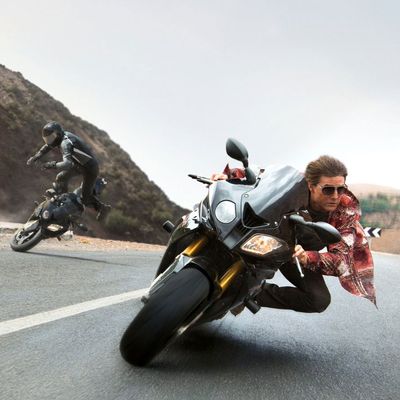
Although the 53-year-old Tom Cruise’s biceps are impressive and his Six Million Dollar Tin Man running style as endearing as ever, the best reason to see Mission: Impossible — Rogue Nation is Rebecca Ferguson, a Swedish-born actress passing easily as a British spy named Ilsa. The character is either a double (good) or triple (bad) agent — but it’s the type of bad that would make most of us want to switch our allegiances in a heartbeat. Actually, Ferguson’s mom is a Brit, which would account for the slight smirk that suggests naughty secrets on an otherwise coolly beautiful face, as well as the kitty-cat purr that makes routine lines sound as insouciant as Emma Peel. Ferguson is a scary-good fighter, too. One minute she’s still, the next she has wrapped her strong limbs around some scummy thug and is pounding away. She fights like someone who thinks more about winning than striking poses.
Mission: Impossible — Rogue Nation doesn’t have the nonsensical lyricism of Brad Bird’s stupendous Mission: Impossible — Ghost Protocol, but it’s still pretty good. It works best when, like Ferguson, it plays things straight instead of (mis)using Simon Pegg’s Impossible Mission Team techie for broad comic relief and Ving Rhames for Lou Grant–like grumpiness. Dull as they usually were, the old poker-faced TV Mission: Impossible crew had dignity. They weren’t always blubbering, “I’m working on it! Hang on! Aaauuggghh!” when one of their thingamajigs jammed. The series is also becoming almost as huggy and self-congratulatory as the Fast and Furious films.
The plot of Rogue Nation has Ethan Hunt (Cruise) once again cast out of the fold, branded as a madman or worse by a CIA director, Hunley (Alec Baldwin), who wants to shut the Impossible Mission Force down on the grounds that it operates without transparency or oversight. There are so many layers of irony here (the CIA whining about lack of oversight, the casting of ultraliberal Baldwin) that Hunley’s congressional debate with IMF coordinator Brandt (Jeremy Renner in the action-movie equivalent of a desk job) ought to be more fun than it is.
Ethan’s crime is arguing that there’s an anti-IMF at large, a “rogue nation” called “the Syndicate” that’s … doing a lot of bad things. This makes Hunley so angry that he puts much of the CIA’s resources into catching Ethan — while various members of his former team chuckle to themselves that no army could catch Ethan Hunt; he’s that smart, cunning, dexterous, muscular, sexually potent, etc. The script is by director Christopher McQuarrie, whose characters voiced similar sentiments about Cruise’s hero in the pair’s last collaboration, Jack Reacher.
A new strain of highbrow fanboy is lately making a case for McQuarrie as an unsung action auteur. Would it were so. He doesn’t have the visual panache to pull off the slapstick-derring-do prologue in which Cruise hangs from an escaping terrorist plane while his hysterical team tries to get the door open for him. An early, subterranean martial-arts clash is edited for maximum chop. A triple-assassin shoot-out with fisticuffs in a Vienna opera house has one or two good moments, but McQuarrie wants so nakedly for it to be a Brian De Palma–style spatial-temporal tour de force that its semi-coherence is an embarrassment.
On the other hand, he delivers a corker of a high-speed motorcycle chase — the road-level camerawork rattles you down to your joints. A climactic knife fight between Ferguson and a burly villain known as the “Bone Doctor” works like gangbusters: It doesn’t have too many variables and it isn’t broken up by one-liners.
As the icily malignant leader of “the Syndicate,” the twisty-faced Sean Harris is like a medieval demon with thick glasses. He and Hunt have a splendid climactic stare-down — elegantly staged and surprising. And McQuarrie has one foolproof weapon: Lalo Schifrin’s original TV theme, blasted so triumphantly whenever Cruise and Company do something right that it’s like the action-movie equivalent of Beethoven’s “Ode to Joy.”


